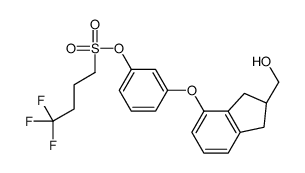| Description |
BAY 38-7271 is selective and highly potent and cannabinoid CB1/CB2 receptor agonist, with Kis of 1.85 nM and 5.96 nM for recombinant human CB1 receptor and CB2 receptor, respectively. BAY 38-7271 has strong neuroprotective properties[1].
|
| Related Catalog |
|
| Target |
CB1:1.85 nM (Ki)
CB2:5.96 nM (Ki)
|
| In Vitro |
BAY 38-7271 shows only minor interactions at the micromolar range with other binding sites such as adenosine A3 receptor (IC50 = 7.5 μM), peripheral GABAA benzodiazepine receptor (IC50 = 971 nM), melatonin ML1 receptor (IC50 = 3.3 μM), and at the monoamine transporter (IC50 = 1.7 μM)[1].
|
| In Vivo |
BAY 38-7271 (Ed50 = 0.02 mg/kg; i.v. and 0.5 mg/kg; i.p.) induces a potent and dose-de-pendent reduction in core body temperature[1]. BAY 38-7271 has low physical dependence liability and is not essentially different from that of other cannabinoid CB1 receptor agonists[1]. BAY 38-7271 (1-1000 ng/kg/h; i.v. infusion; for 4 hours) shows neuroprotective efficacy in the rat SDH model[1]. BAY 38-7271 also has neuroprotective efficacy in models of transient and permanent occlusion of the middle cerebral artery and brain edema models[1]. Animal Model: Wistar rat ,TBI rat models (acute subdural hematoma, SDH)[1] Dosage: 1 ng/kg/h, 10 ng/kg/h, 100 ng/kg/h, 1000 ng/kg/h Administration: Intravenous infusion, for 4 hours Result: Reduced the mean infarct volume.
|
| References |
[1]. Mauler F, et al. BAY 38-7271: a novel highly selective and highly potent cannabinoid receptor agonist for the treatment of traumatic brain injury. CNS Drug Rev. 2003 Winter;9(4):343-58.
|
